Tagged: little league
Winning’s the goal, but it isn’t the point
A couple of years ago, I had the chance to attend a pitching clinic that Jonathan Papelbon gave for kids. My eldest son, who was about 8 at the time, was one of his 40-or-so students that day. The night before the clinic, Pap had blown a save against the Yankees, so we were all a little worried about the mood that he would bring to the clinic. And he did look exhausted and beaten down, but he was tremendous with the kids, teaching them a lot of important pitching basics and spending some one-on-one time with all of them. And after the clinic, he stuck around to sign autographs for the kids and to answer all of their questions.
Pap said a lot of great things that day — things that a parent really wants his son to hear from an all-star major leaguer — but what I remember most was what he told the kids about winning. Someone asked him about how he bounces back after a painful loss to the Yankees, and he went off on a philosophical rampage. “Hey, I feel bad because I let my teammates down. But you young kids, you need to remember that playing baseball is supposed to be all about fun. Winning and losing — it really doesn’t matter when you’re young, as long as you’re having fun.” He went on to say, “Now, when you start getting paid to play, winning becomes the main thing. But not until you get to the pros. And you all have a long way to go ’til then. So don’t get all caught up in winning and losing. Remember, baseball is all about having fun.” It was a message straight from his heart, almost like he wished he could go back to those days when fun was the main goal of pitching – not beating the Yankees, not making a living.
This past summer, my son played on a summer baseball team of very good 9/10 year-olds. I was one of the coaches. We had practices or games perhaps 4-5 nights per week, and we ended up going 20-2-1 and winning the league championship on the last day of the season. At the end of the championship game, we presented the kids with their championship trophies, and they all felt really marvelous. All of us coaches high-fived and embraced – after all, we were champion coaches, and we had helped to give our children and their teammates the unique feeling of being champions (plus, we had successfully avoided the uncomfortable feeling of coming oh-so-close and then losing).
I received congratulations from many people for winning it all – parents of our players, other coaches in the town, and some close family and friends who had followed my son’s team’s season. Being the last team standing is just such a rare achievement, and it’s a fantastically simple, no-nonsense way to evaluate the success of a team’s season.
But the success of our season shouldn’t be defined only by our win-loss record or the fact that we won the league championship. Winning was the goal, but it was never the point, and the allure of winning makes this easy to forget.
The point was, as Papelbon said, having fun. The point was improving young baseball players’ physical skills. The point was teaching them how to think – before the game and in every game situation. The point was teaching kids the value of practicing in the right way. The point was teaching them to play as a team. The point was teaching them to never give up, and to bounce back from disappointing at-bats, plays, or games. The point was improving their resilience and focus. The point was developing leaders. The point was teaching kids to have the courage to dream about winning but to avoid becoming attached to that outcome. The point was teaching them to cheer for each other and keep each other “up” at all times. The point was teaching them to stay loose and to smile. The point was giving kids an experience, through a series of practices and games, that would not only give them joy today — for joy’s sake — but also help them to grow into happier, more self-confident people, better equipped to face challenges in the future.
We coached with these objectives in mind all summer, and this is why I’m proud of our team’s season. The goal of winning simply gave us a context for teaching all of these other vastly more important lessons.
Lots of coaches achieve these objectives with their youth athletic teams, but fail to win the championship or even to have a winning season. And, I fear, plenty of youth athletics coaches “win it all” and point to that accomplishment as justification for everything they did — even though their coaching methods may have totally missed the point of youth athletics.
So I have my championship trophy, but its value isn’t its inherent symbolism of our team’s ability to score more runs than almost every other team. The value of the trophy — to me — is in the memories it holds of the players’ happy afternoons and evenings playing the wonderful game of baseball, and in my son’s and his teammates’ evolution as competitors, as teammates, and as human beings.
There IS Crying In Baseball
Yes, with (almost) all of our pro sports teams winning and winning and winning, it’s a great time to be a young sports fan in Boston. Winning feels so darn good, doesn’t it? But losing is part of sports too, no matter how good our teams are, and its potentially painful effects are most transparent in the way kids respond to losses.
When he was six, my oldest son cried and cried and cried into my shoulder as we left Fenway Park following the last out of game three of the 2005 A.L. Division Series, a loss that gave the Chicago White Sox a sweep of the Red Sox. And when the Patriots lost the Super Bowl earlier this year, his whole 8 year-old body crumpled into a weeping blob in front of the TV. Losing was clearly a concept that he found difficult to grasp, let alone deal with.
But those were losses of teams he was merely rooting for. Losing a big game in which HE had played a major role hadn’t happened to him yet…. until last week, when his 8 year-old summer travel team lost its first game of the summer (after starting with five wins).

What a scene, as our opponents piled up runs at the end of the game to complete their impressive comeback. Boys sobbing on the bench, boys sobbing into their gloves in the outfield. Deep down, each boy had believed in the possibility of an undefeated season, so to them, it felt like an elimination playoff game. As they saw their hopes slipping away, the tears flowed and their bodies shook uncontrollably. It was almost comical.
And what can a coach say to an entire team of 8 year-olds that’s bawling, down by five runs with its last at-bat coming up? Part of you wants to say, “There’s no crying in baseball! STOP IT!” Part of you wants to say, “Come on guys, focus on your next at-bat, we can still come back,” and part of you wants to just hug them all and say, “It’s OK, it’s OK, it’s just a baseball game.” After the last out of the contest, the other team celebrated as though they had just won game 7 of the World Series, which made the loss even harder for our guys. Their distress was palpable.

I recently heard the famous, veteran Channel 4 sportscaster, Bob Lobel, say that that over the years, he learned a lot more from Boston’s biggest losses than he did from Boston’s biggest wins. I have no doubt that my son and his teammates learned a lot more from that loss than they did from any of their wins. And since it was my son who came in to “close” the game (after doing so successfully in two previous games) and ended up allowing the eventual winning runs, then striking out to make the final out of the game, I suppose he had the greatest learning opportunity!
I’d love to know the content of other parents’ conversations with their demoralized children on the drive home from the game, but here’s how ours went.
Me: “Son, you should be proud, you did what we asked you to do – you threw strikes. That’s the only thing you could control. You did your job.”

My son: “All the coaches said the same thing. You did great, Crawford, because you threw strikes. But I know they really don’t mean it. What they really wanted was for me to get outs, not just throw strikes. I mean, it’s better if I throw balls out of the strike zone and the batters get out, than if I throw strikes and they get hits and score runs.”
Me: “But if you throw pitches out of the strike zone, you’ll walk batters and those always turn into runs. All you can do is throw strikes, and you did that.”
My son: “Daddy, the bottom line is that a pitcher is supposed to get people out. I mean, I don’t care if I strike out a kid or if he lines out to center field, an out’s an out. Just like if we win 20-0 or 2-1, a win is a win and the score doesn’t matter.”
Me: “Well, I won’t argue with that. But listen, it’s not your fault that the team lost. There were some errors behind you and the umpire made a questionable call. You had to pitch much longer than was necessary to get out of that inning. And give the other team some credit – they won the game by getting some key hits. It’s not your fault.”
My son: “You can say it’s not my fault, but the bottom line is that it IS my fault. I had control over how the game ended up. I could have made different pitches at different speeds and at different locations that would have made them not hit the ball or not hit it hard. And I also made the last out. If I had gotten a hit, maybe it would have started a five-run, two-out rally. So it IS my fault, Daddy, no matter what you say to try to make me feel better!”

Amazed at his mature sense of ownership and responsibility, I just told him, “Well, I’m proud of you – for how you played, and for having the guts to pitch in that situation.” We drove on in silence.
And as he drifted off to sleep in his booster seat, clutching his blankie, I said to myself, Losing a close game just stinks – whether you’re an 8 year-old in little league or a 28 year-old in the Major Leagues, and there’s nothing a mom or dad can do to help his/her child avoid losing, nor anything he/she can say to eliminate losing’s sting. A good night’s sleep and another game to play, it turns out, is the only remedy. Children, welcome to the wonderful world of competitive baseball, the most spectacular roller coaster ride ever invented…
To read a classic series of poignant articles chronicling a father’s observations of his 12 year-old son’s little league season (by Mark Kramer, featured in The Boston Globe), click here.
http://www.box.net/static/flash/widget_player.swf
Get your own Box.net widget and share anywhere!
To download the songs, “I’m A Member of Red Sox Nation” and “Opening Day” for free, please visit my other blog, Crawdaddy Cove.
Youth Baseball in Red Sox Nation: The Tryouts
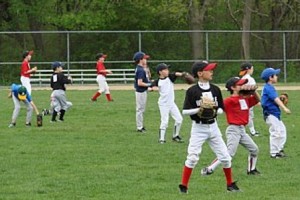 “Tonight, you need to take your son to his summer league baseball tryouts, OK?” my wife said to me on a recent Sunday morning. No problem, I replied. I assumed that every child would be placed on a team appropriate for his level of skill, and that my baseball-loving son would simply be auditioning to show coaches which team he belonged on. What is it that they say about assumptions?
“Tonight, you need to take your son to his summer league baseball tryouts, OK?” my wife said to me on a recent Sunday morning. No problem, I replied. I assumed that every child would be placed on a team appropriate for his level of skill, and that my baseball-loving son would simply be auditioning to show coaches which team he belonged on. What is it that they say about assumptions?
56 kids showed up for the tryout at a field with four diamonds. Each checked in at a table and received two stickers with a number — one for the front of the shirt, one for the back of the shirt. Then, they all found a partner and started to warm up their arms. What a sight: 28 pairs of 8 year-olds playing catch, each with visions in their heads of making a summer travel team, hitting .400, and eventually playing for the Boston Red Sox. Even the ones who can’t catch and can’t throw.
Parents toting thermoses set up their lawn chairs at one end of the field to watch. I struck up a conversation with a friendly looking dad, and it was then that I learned that only 26 of these children would make a team — that there would be an “American” team and a “National” team (each consisting of 13 players) and that 30 kids would be cut. Those 30 kids would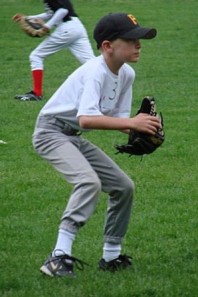 have NO team to play on this summer. (“The spring league is for participation,” the other dad told me. “The summer league is for development and competition.”)
have NO team to play on this summer. (“The spring league is for participation,” the other dad told me. “The summer league is for development and competition.”)
I was stunned. In my own baseball experience, I didn’t face do-or-die tryouts until sophomore year in high school (I still remember Coach Cohen reading my name at the end of that tryout, indicating I had barely made Brookline High’s JV team. In fact, the stick I picked up off the ground and held in my hands as he read my name sits on my dresser, the only good luck charm I’ve ever had.) Thinking from the point of view of an 8 year-old ballplayer, I was stunned at the harshness of it. And I was bewildered by the idea of 30 moms and dads consoling their third graders about not having a team to play on this summer. What would I say to my son if he were cut? Honestly, I couldn’t even begin to imagine that conversation. The kid lives for baseball. It would be devastating. I decided to cross that bridge if I came to it, and hope for the best.
The children were split into four groups of 14, and they cycled through four stations (hitting, ground balls, fly balls, and live infield situations) where they were evaluated by two to three coaches, each scribbling away on his clipboard after every play. Suddenly, it dawned on me that the skills my son had developed during those endless hours of wiffle ball in our backyard, and the thousands of ground balls and fly balls we had practiced in our front yard, and the two seasons of coach-pitch little league were being evaluated right now. It occurred to me that if I’d known the cut-throat nature of our town’s summer league tryouts, I’d have practiced a lot more with my son over the last year. Then it occurred to me that it was probably good that I didn’t know this, since it might have brought out the the “crazy over-coaching dad” that’s probably inside of me somewhere, which definitely would have killed my son’s passion for the game. His wiffle ball experience will have to carry him, I reasoned.
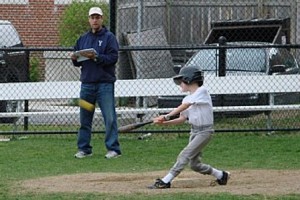 My heart sank every time he swung and missed. I wanted to bellow some encouragement to him, but with all the other parents silently rooting against my son, it didn’t feel right. Then he connected. I was surprised at my pride. Then a line drive, and another one. A couple of foul balls, a miss, then a weak grounder to third. “NEXT!” yelled the evaluator, and he was back in the field. Was that good enough? I asked myself.
My heart sank every time he swung and missed. I wanted to bellow some encouragement to him, but with all the other parents silently rooting against my son, it didn’t feel right. Then he connected. I was surprised at my pride. Then a line drive, and another one. A couple of foul balls, a miss, then a weak grounder to third. “NEXT!” yelled the evaluator, and he was back in the field. Was that good enough? I asked myself.
He looked solid on the grounders – got in front of every ball, kept his butt down, used two hands, made some crisp throws to first base. For a moment, I deluded myself into believing I’d taught him his technique — the truth is, he was simply imitating his favorite player, Nomar Garciaparra.
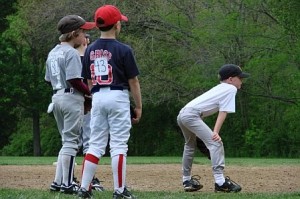 At the end of the tryout, the coaches called the kids in and had them get down on one knee at home plate. Then one of the coaches brought over a gigantic trophy and explained to the youngsters that last year’s 8 year-old team from our town had gone undefeated and had won that trophy, and that the tryout group couldn’t touch it until they had won the right to have their own team’s name engraved on it. Nice. 30 of these kids are going to get bad news in a few days, and now that news will be even more painful to receive. I assure you, none of those 56 kids was in a state of mind to be inspired by the trophy – they just wanted to earn the chance to wear a town uniform!
At the end of the tryout, the coaches called the kids in and had them get down on one knee at home plate. Then one of the coaches brought over a gigantic trophy and explained to the youngsters that last year’s 8 year-old team from our town had gone undefeated and had won that trophy, and that the tryout group couldn’t touch it until they had won the right to have their own team’s name engraved on it. Nice. 30 of these kids are going to get bad news in a few days, and now that news will be even more painful to receive. I assure you, none of those 56 kids was in a state of mind to be inspired by the trophy – they just wanted to earn the chance to wear a town uniform!
Part II of the tryout continued one week later. The kids were obviously grouped by ability this time, and I was relieved to see that my son was in a group of somewhat capable players. I just wanted him to make a team — any team! I hadn’t begun to compose my “Michael Jordan didn’t make his high school JV team” speech, and I really didn’t want to. 30 of us parents were going to have to come up with something to ease their pain, though. I dreaded that, for all of us.
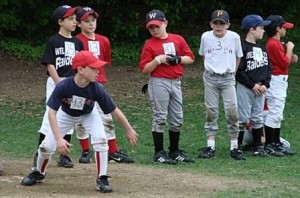 In the final twenty minutes, the coaches had the players line up at home plate and they timed them running from home to first, then again from home to second. As the kids crossed the base, the timer yelled out the results for all to hear, and another guy with a clipboard wrote down the times. I felt like I was at the NFL pre-draft combine. Then, the five fastest kids raced, then they narrowed it to two, and those two raced…. and we have a WINNER! And everyone cheered for the fastest boy. (The point of this, other than pure enjoyment for the adults running the tryout, completely eludes me.)
In the final twenty minutes, the coaches had the players line up at home plate and they timed them running from home to first, then again from home to second. As the kids crossed the base, the timer yelled out the results for all to hear, and another guy with a clipboard wrote down the times. I felt like I was at the NFL pre-draft combine. Then, the five fastest kids raced, then they narrowed it to two, and those two raced…. and we have a WINNER! And everyone cheered for the fastest boy. (The point of this, other than pure enjoyment for the adults running the tryout, completely eludes me.)
On the way home, my son spoke with total self-confidence. He was sure he had made one of the teams. I suspected all 56 of the young men felt the same way. “If you do make a team, do you care which team you’re on?” I asked. Nah, he said, I just want to play. I was about 43 times more nervous for him than he was for himself. So, this is what it’s like being the parent of an aspiring athlete, I thought. (Butterflies, and a total lack of control over the outcome.)
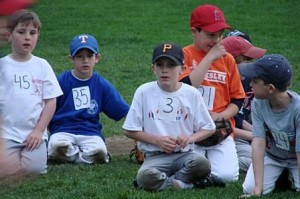 Then came the wait. 3 days, 4 days, 5 days, and no word from the league. “Did you get an email?” was the first thing my wife and I said to each other when we talked on the phone from work, or when we arrived home in the evening. “Nope, nothing.” Finally, an email came late one night. Based on the recommendation of our evaluators, we are pleased to offer your child a position on our Summer Eight Year Old National Team.
Then came the wait. 3 days, 4 days, 5 days, and no word from the league. “Did you get an email?” was the first thing my wife and I said to each other when we talked on the phone from work, or when we arrived home in the evening. “Nope, nothing.” Finally, an email came late one night. Based on the recommendation of our evaluators, we are pleased to offer your child a position on our Summer Eight Year Old National Team.
I woke up my wife to tell her. We both felt the relief sweep over us, like we had just dodged a cannonball. And our son? When we told him the next morning, he was actually a little bit disappointed. Turns out he had his heart set on the American team, which he perceived to be the more prestigious of the two. Did I mention he’s got a lot of self- confidence?
I couldn’t help but wonder about the other 30 kids who’d been cut, all of whom wanted to play baseball this summer. And what about their parents? At the same moment my wife and I were feeling a rush of relief, they were all preparing their consolation speeches. What could they say? “Michael Jordan was cut from his high school JV basketball team” is a good start, but then what? Perhaps towns should give all parents a “handbook on talking with your child about tryouts” when they arrive on that first day. I know I could have used something like this had my son not been so fortunate….
http://www.box.net/static/flash/widget_player.swf
Get your own Box.net widget and share anywhere!
To download the songs, “I’m A Member of Red Sox Nation” and “Opening Day” for free, please visit my other blog, Crawdaddy Cove.
